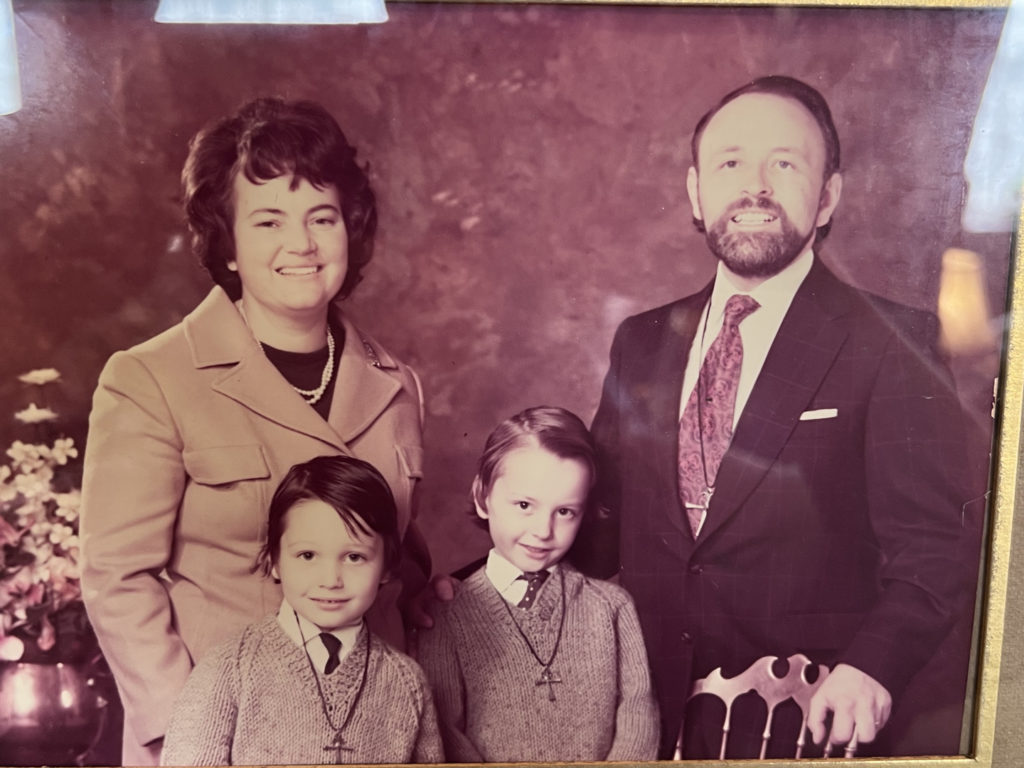We are not very good at dying, and yet, it is the one thing in our lives that we are all certain to do sometime. It is one of the great acts of living – some die in valor, some in pain, some young, others old – and my mother has been preparing for it every day of her life.
As I write this I am sitting at my mother’s bedside listening to her breathe. It’s just the two of us and the night. There are wires and machines hooked up to her. On occasion, nurses barge in a flurry of light and needles. But for now, she is lying peacefully just a few feet away from me, drawing what may be her final breaths. The darkness and the stillness of the night are a welcome break from the day that just ended.
I was in Palm Springs when my WhatsApp blew up with news of my mother’s sudden illness. My brother James was in Rwanda preparing to greet Prince Charles and Camilla at the Kigali Genocide Memorial. Steph, my daughter, was in Portugal after completing her master’s degree. Natalia and Aaron, my other two children, were in Los Angeles. My brother’s wife Louise and their children were in London. Hours later from all four corners of the globe, her children, their wives and former wives, and grandchildren rallied around her bedside in England.
Our family can be a little overwhelming. Over a dozen of us filed in to see her in staggered relays. Some stay overnight as makeshift nurses, others on catering or car shuttle service. No one had a plan, but we all knew we were going to be there in some capacity. That was as natural as breathing.
It was an exhausting day. The travel, the not knowing, direct message channels pinging. There was the usual conflicting medical advice, conversations about critical care, and end-of-life health directives.
My mother could hardly lift her head or speak, but as each grandchild appeared throughout the day, her face lit up with joy. They brought her soft toys, flowers, and reprised songs they had sung as children with her. They were sad, but mature in the face of death. They told stories and made jokes they knew she would love. And because they know how much their grandmother loves to pray, they prayed with her too.
My father has dementia. He also loves his wife with a passion, which is the one thing he does not forget. As I wheeled him into her room, I was not sure how he would react seeing his beloved wife of 58 years wired up and largely unresponsive. I had just had a long conversation with both of them on Father’s Day. She is deaf and he cannot remember what has just been said. And so he translates, she responds, he agrees, and then forgets. And so it starts again. Sometimes he gets confused and becomes angry. I wondered if that might happen tonight.
My father saw his wife in pain and tenderly stood by her bedside, telling her how much he loved her. He reminded her of happy times and how they have been best friends for decades. “Buddies,” “chums,” “love of my life” – he said several times. He was eloquent, tender, and full of a deep-seated love for her that temporarily overcame his tormented mind. He prayed a prayer like only a former minister of religion can do with those who are dying. He leaned over the bed and kissed her one last time. I have never in my life seen such a display of poised love and devotion.
My father is no stranger to death. His father died when he was six. Then he himself sat on the precipice of death in a TB ward for three years as a teenager. One day he would be joking with his neighbor in the adjacent bed, the next day it was empty. At seventeen he was orphaned, nursing his own mother in his arms as she left him to fend for himself. He became a Methodist Minister, went to many hospital bedsides, and sat with grieving families. My father learned the art of dying long ago. I watched in wonder as he effortlessly helped my mother prepare for hers. Then five minutes after he left her, he had forgotten he had ever been there.
My mother has always been a believer. She has a passionate faith, which she loved every day of her life. She would rise early to read the scriptures and she would pray for everything and everyone. She also has a heart for humanity. She made it her business to travel the globe – to India, the Far East, and the USSR, to take her message of faith, truth, and justice. She is a warrior modeled on the character of Deborah, the female judge of Israel in the biblical book of Judges – an upright woman of immense principle.
She has two sons, but she is also a mother to many. She naturally mothers the weak, the lonely, and the lost. And not only. She is a motherly figure to the strong, the noble, and the accomplished too.
Her greatest strength is effortless and detailed communication. She can easily correspond with 250 people a month. She knows everything about them, their children, their jobs, and even their dogs and cats. That is because everyone she meets has something special about them, someone she wants to know more deeply, and she takes the time to get to know them all.
Among the many people she met and knew in her life, it is those who survived the Holocaust and genocide that inspired her the most. She was taken by their courage, inspired by their words, and honored to be their friend. The Queen of England recognized her work as a supporter, friend, and advocate of many survivors of the Holocaust. Just a few days ago, she wanted to tell me that she just learned about some of the amazing talks her friend Vera had given on subjects other than her experience during the Holocaust. ‘Did you know what a brilliant mind she possesses?!’ She quelled.
As I sit here, the life-giving hiss of oxygen does not fool me that her chances of survival have improved. I am not reflecting on the imminence of her departure. Instead, I feel the lingering tenderness of her family as they said goodbye to her mortal body earlier today. It occurred to me that the things that define her, her lion-heart, her faith, her values, her love of God and humanity, will not die with her, they are part of her future. They are the essence of her that lives on, that death cannot claim – her legacy, her memory, the ongoing gift of the life she lived.
In January this year, I sat for two days with my mother in her home and asked her to answer scores of questions for her StoryFile. She answered me honestly about her upbringing in India, her childhood difficulties transitioning to England, as well as things that matter most to her. Not only did I discover that she came from a Seventh Day Adventist background (no wonder she loves Shabbat so much!), but I also learned about her views on the environment and politics too. Those few hours of conversation are captured for a lifetime. One day her great-great-grandchildren will look her in the eye and ask her about her life, and she will tell them, face to face.
We have yet to master how to become ancestors, of moving on from this world, but yet we leave behind us the things that really matter most about us.
We also need to learn the art of dying, not to fear it, but rather to embrace it, and live it when it comes. Today on her deathbed my mother lived it with grace, dignity, and gratitude. As I write she is still fighting for another day with her family with all her might. And swirling all around us are all the love, the memories, the blessings of a life well-lived.
Update: My mother passed away peacefully hours after this was written.

